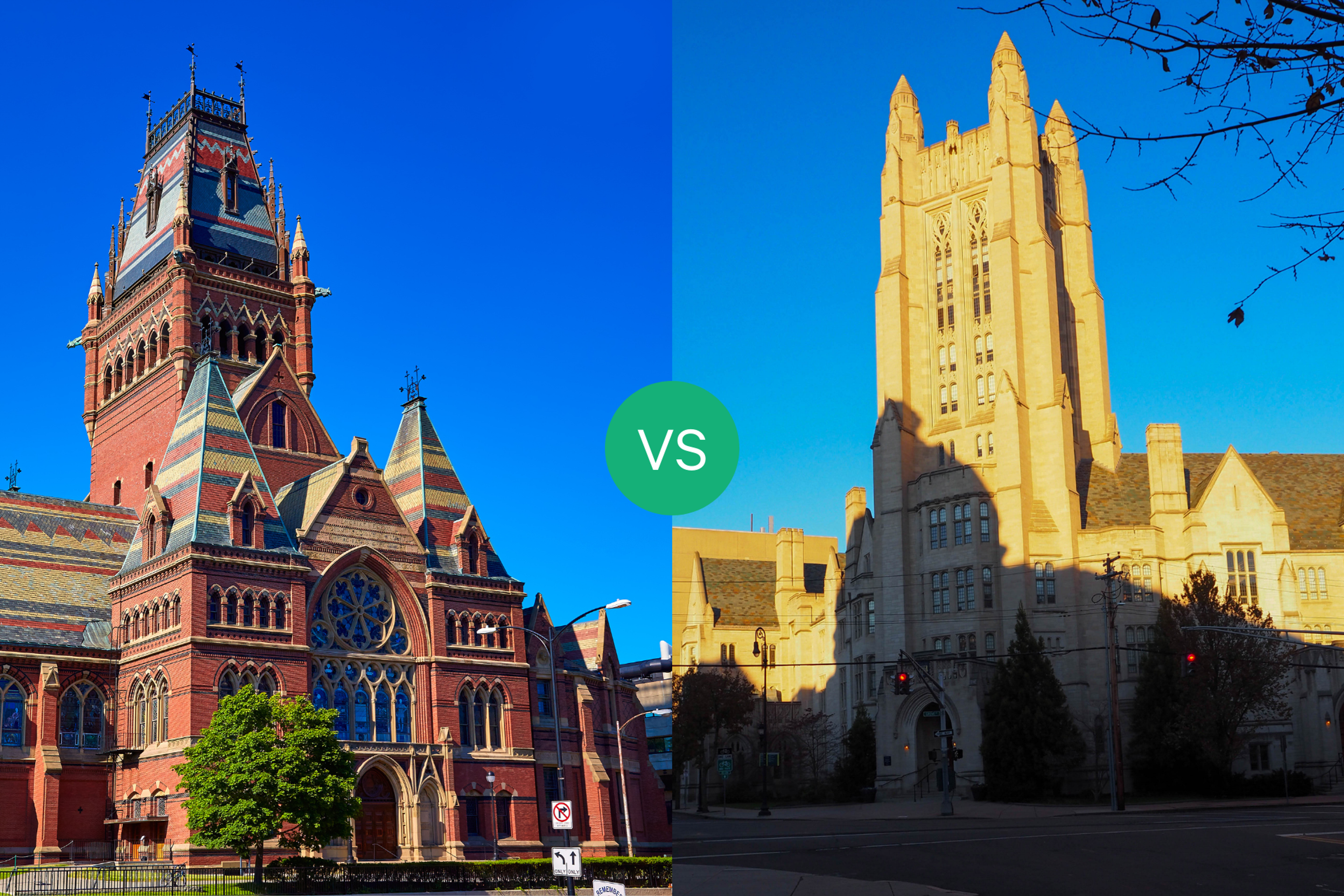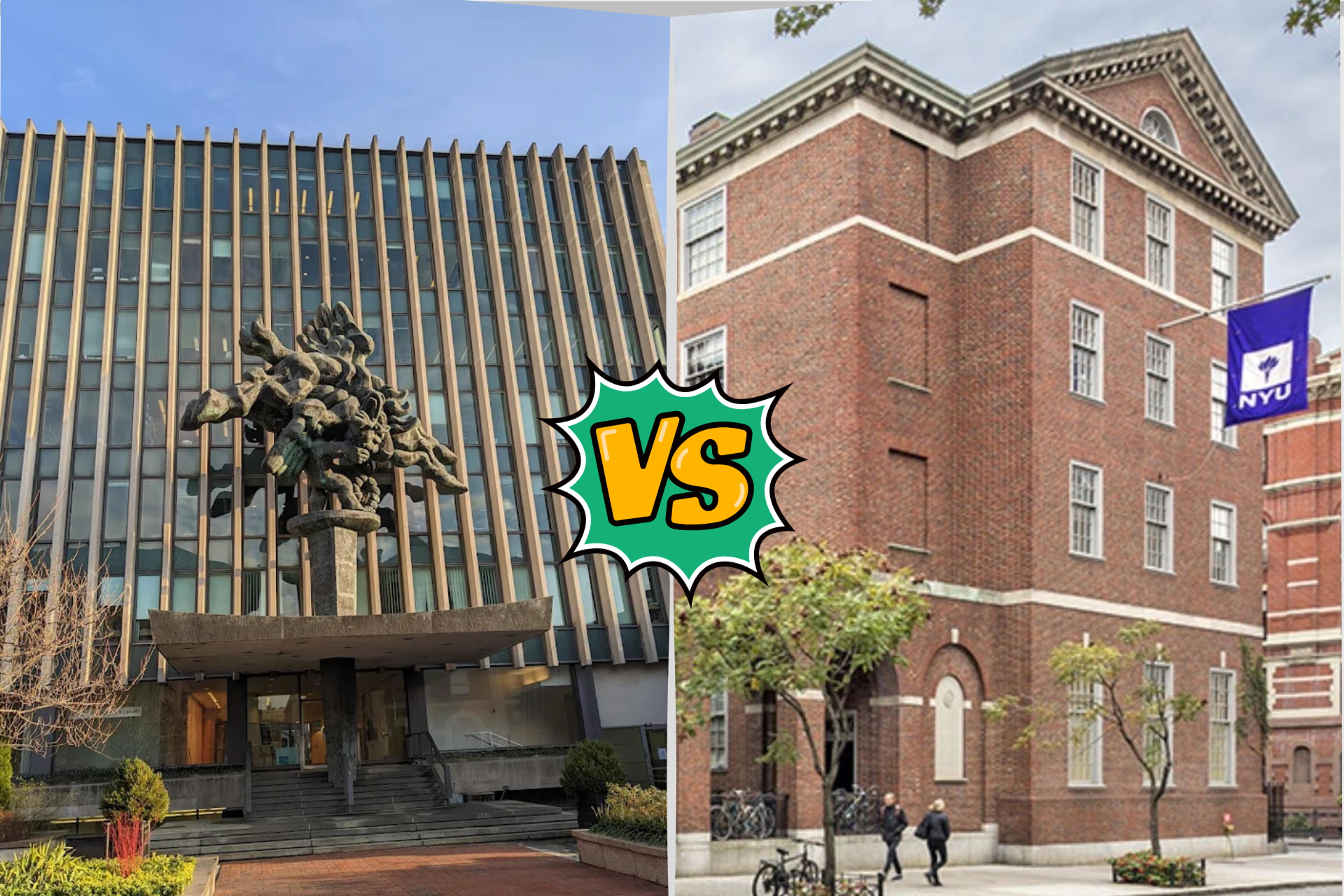University of Chicago Law School Vs. University of Texas--Austin School of Law: An In-Depth Comparison
Discover the key differences between the University of Chicago Law School and the University of Texas--Austin School of Law in this comprehensive comparison.
Posted June 13, 2025

Join a free event
Learn from top coaches and industry experts in live, interactive sessions you can join for free.
Table of Contents
Choosing the right law school can be a daunting task. With so many options available, it's important to carefully consider each school's unique offerings and determine which one is the best fit for you. In this article, we will compare two esteemed law schools: the University of Chicago Law School and the University of Texas--Austin School of Law. We will take an in-depth look at various aspects of these institutions, from location and campus facilities to alumni network and job prospects. By the end of this article, you should have a clear understanding of what each school has to offer and be well-equipped to make an informed decision about your future legal education.
Location and Campus Facilities: How do the two law schools compare?
One major factor to consider when choosing a law school is its location and the facilities available on campus. The University of Chicago Law School is located in the heart of Chicago, Illinois. Its campus is large and modern, with state-of-the-art facilities such as a law library, classrooms with cutting-edge technology, and a moot court room. The law school is situated in a vibrant neighborhood, close to various restaurants, shops, and cultural institutions.
The University of Texas--Austin School of Law, on the other hand, is located in Austin, Texas. Its campus is equally impressive, with a law library that spans four floors, a state-of-the-art moot courtroom, and multiple classrooms equipped with the latest technology. The campus is situated in a lively area of Austin, with easy access to local attractions, restaurants, and entertainment options.
Admissions Requirements: What sets these law schools apart?
Another important aspect to consider is the admissions requirements for each school. The University of Chicago Law School has a highly competitive selection process. Students must have excellent academic credentials, a strong personal statement, and impressive letters of recommendation. The school also places a high value on diversity, and actively seeks to enroll students from a wide range of backgrounds.
The University of Texas--Austin School of Law has a more holistic approach to admissions. While academic credentials are important, the school also looks for candidates who demonstrate leadership, service, and a commitment to public service. Additionally, the school places a strong emphasis on enrolling a diverse student body.
Curriculum Offerings: A detailed look at what each program offers.
The curriculum at each law school is a crucial factor to weigh when considering your options. The University of Chicago Law School offers a comprehensive legal education, with a strong focus on traditional legal doctrine and theory. Students have the opportunity to take courses in a wide range of areas, including intellectual property law, labor law, and international law. The school also offers various clinics and experiential learning opportunities, such as the Mandel Legal Aid Clinic, where students can gain hands-on experience working with clients.
The University of Texas--Austin School of Law offers a similarly diverse curriculum, with a focus on experiential learning. The school offers various clinics and externships, where students can gain practical legal skills and experience. The school also offers a specialization in the area of public interest law, which provides students with opportunities to engage in public service and social justice work.
Faculty and Staff: Who are the professors and staff members that make up each school's law department?
Another important aspect to consider is the faculty and staff at each school. The University of Chicago Law School has a renowned faculty, with many professors who are leaders in their respective fields. The faculty includes several Nobel laureates, former Supreme Court clerks, and high-profile legal scholars. Additionally, the school has a dedicated staff that provides important support services for students, such as career counseling and academic support.
The faculty and staff at the University of Texas--Austin School of Law are similarly impressive. The school boasts a diverse faculty, with many professors who have extensive experience in private practice and public service. Additionally, the school has a staff that is dedicated to supporting students' educational and professional goals.
Prestige and Ranking: How do these schools rank nationally and internationally?
While rankings aren't everything, they can provide some insight into a school's reputation and standing in the legal community. According to U.S. News & World Report, the University of Chicago Law School is currently ranked #4 in the nation. The school is also highly regarded internationally, with a reputation for producing top-quality legal scholars and practitioners.
The University of Texas--Austin School of Law is also highly ranked, currently sitting at #15 in the nation according to U.S. News & World Report. The school has a strong reputation for its clinical programs and public service offerings.
Student Life: What is it like to be a law student at either of these institutions?
The law school experience isn't just about academics—it's also about student life. Both the University of Chicago Law School and the University of Texas--Austin School of Law offer a rich student experience, with various opportunities for extracurricular activities and socializing.
The University of Chicago Law School offers various student organizations and clubs, including the Black Law Students Association, the Latinx Law Students Association, and the Law Women's Caucus. The school also hosts various events throughout the year, such as speaker series and social events.
The University of Texas--Austin School of Law offers an equally vibrant student life, with various organizations and clubs such as the Public Interest Law Association and the Law & Technology Society. The school also hosts social events and speakers throughout the year.
Job Prospects and Career Services: Which school offers better opportunities for post-graduation employment?
One of the most important considerations when choosing a law school is the job prospects available to graduates. Both the University of Chicago Law School and the University of Texas--Austin School of Law have impressive employment statistics.
According to the 2020 Employment Report for the University of Chicago Law School, nearly 98% of graduates found employment within 10 months of graduation. Graduates went on to work in a wide range of sectors, including law firms, government agencies, and public interest organizations.
The University of Texas--Austin School of Law boasts similarly impressive employment statistics. According to the 2020 Employment Report, over 88% of graduates found employment within 10 months of graduation. Graduates went on to work in a wide range of sectors, including private practice, government, and public interest.
Alumni Network: A comparison of the alumni networks of both schools.
Another crucial consideration is the alumni network available to graduates of each school. The University of Chicago Law School has a vast alumni network, with graduates working in various industries across the globe. The school also has an active alumni association, which provides networking opportunities and support for graduates.
The University of Texas--Austin School of Law also has an impressive alumni network, with graduates working in a wide range of sectors across the country. The school has an active alumni association, which provides networking opportunities and career support for graduates.
Scholarships and Financial Aid: Which school offers more financial assistance for students?
For many students, financial considerations are a crucial factor when choosing a law school. Both the University of Chicago Law School and the University of Texas--Austin School of Law offer various scholarships and financial aid packages to support their students.
The University of Chicago Law School offers a generous financial aid program, with over 85% of students receiving some form of financial assistance. The school offers various grants and fellowships to help offset the cost of tuition.
The University of Texas--Austin School of Law also offers a range of financial aid packages, including scholarships and grants. In some cases, the school may also provide loan forgiveness programs to help students manage their debt after graduation.
Moot Court Competitions and Mock Trials: A comparison of the two schools' programs for practical legal experience.
Practical legal experience is an important aspect of any legal education. Both the University of Chicago Law School and the University of Texas--Austin School of Law offer various programs to help students gain practical legal skills.
The University of Chicago Law School has a well-regarded moot court program, which allows students to participate in simulated appellate arguments. The school also offers various clinics and experiential learning opportunities, such as the Federal Criminal Justice Clinic.
The University of Texas--Austin School of Law offers a similarly robust program for practical legal experience. The school has a moot court program, as well as various clinics and externships that allow students to gain hands-on experience in areas such as immigration law and intellectual property law.
Diversity and Inclusion Initiatives: An analysis of how each school fosters diversity and inclusion among its student body.
Creating a diverse and inclusive environment is a crucial goal for many law schools. The University of Chicago Law School has various initiatives to promote diversity and inclusion, such as the Diversity Committee and the Law School Pipeline Program. The school also has a Diversity Month, which celebrates and highlights the diverse perspectives and experiences of its students.
The University of Texas--Austin School of Law also places a high value on diversity and inclusion. The school has various organizations and initiatives, such as the Thurgood Marshall Legal Society and the Chicano/Hispanic Law Students Association. Additionally, the school has various diversity and inclusion events throughout the year, such as the Diversity Retreat.
Extracurricular Activities: A look into the various clubs, organizations, and events available to law students at both institutions.
Law school isn't just about academics—it's also about building relationships and exploring your interests outside of the classroom. Both the University of Chicago Law School and the University of Texas--Austin School of Law offer various extracurricular activities to help students do just that.
The University of Chicago Law School has various student organizations and clubs, such as the Law and Arts Society and the Corporate and Securities Law Society. The school also hosts various events throughout the year, such as the University of Chicago Law Review Symposium and the Women's Leadership Coalition Conference.
The University of Texas--Austin School of Law also has various organizations and clubs, such as the Women's Law Caucus and the LGBT Law Society. The school also hosts various events, such as the Public Interest Law Symposium and the Texas Journal of Oil, Gas, and Energy Law Symposium.
Technology and Innovation in Legal Education: How does each school use technology to enhance legal education?
Technology is rapidly changing the legal landscape, and it's important that law schools stay up-to-date with these changes. Both the University of Chicago Law School and the University of Texas--Austin School of Law have innovative programs to help students stay ahead of the curve.
The University of Chicago Law School has a dedicated program in legal innovation, which helps students explore the intersection of law and technology. The program offers various courses and events, such as the Legal Tech Bootcamp and the Law and Technology Seminar.
The University of Texas--Austin School of Law also has a strong focus on technology, with various courses and programs dedicated to the topic. The school also has a Technology Law and Policy Clinic, which allows students to work on real-world technology cases.
Bar Exam Pass Rates: A comparison of the bar exam pass rates for graduates of both schools.
Passing the bar exam is a crucial step towards becoming a practicing lawyer. Both the University of Chicago Law School and the University of Texas--Austin School of Law have impressive bar exam pass rates.
According to recent data from the American Bar Association, over 96% of graduates from the University of Chicago Law School passed the bar exam on their first attempt. Similarly, over 92% of graduates from the University of Texas--Austin School of Law passed the bar exam on their first try.
Student Testimonials: Hear from current students about their experiences at each institution.
While statistics and rankings can provide some insight into a school's offerings, it's also important to hear from current students about their personal experiences. We spoke with several students from both the University of Chicago Law School and the University of Texas--Austin School of Law to hear about their experiences at each institution.
"I really appreciate the focus on traditional legal doctrine and theory at the University of Chicago Law School," said John, a third-year student. "It has helped me become a more well-rounded lawyer and thinker."
"I was drawn to the University of Texas--Austin School of Law because of its focus on public service and social justice," said Emily, a second-year student. "I've been able to get involved in various clinics and organizations that align with my values."
Conclusion: Which law school is right for you?
Ultimately, the decision of which law school to attend depends on a variety of factors, including your personal goals, interests, and priorities. Both the University of Chicago Law School and the University of Texas--Austin School of Law have impressive offerings and opportunities for their students. We hope that this article has provided you with a comprehensive overview of each school, and helped you make an informed decision about your future legal education.
Browse hundreds of expert coaches
Leland coaches have helped thousands of people achieve their goals. A dedicated mentor can make all the difference.


















